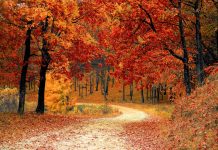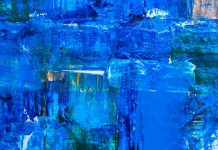Tracking Down Clues
Your poetry has me scratching my head
and beyond.
Everything’s so random.
Like the words were spilled not written.
You must imagine yourself
a Jackson Pollock of the literary world,
maybe make sense
but, most likely, not.
And yet, here I am,
thumbing through your latest chapbook.
The lines may be meaningless
but they’re your lines,
the rhythms, your rhythms,
the sounds, your sounds.
And what else do I have to go on?
Your conversation barely scrapes
your surface.
Your body language
was last spoken by the dead.
So all the clues must be here:
the wishing pole,
the underground airplane,
the sideways daydream,
the pigeon parasol.
What can I say?
I’m not in love with a masturbating toadstool.
But I’ve a feeling I may have to be.
My Course in Poetry
My teacher treated poetry reverently.
Like the saints, every poet was dead.
Every poem was interred
in the book we were assigned.
La Belle Dame Sans Merci for example –
I wondered how long she’d been lying there.
And every line was like hieroglyphics.
Our job was to blow away the dust,
extract every possible meaning
from a word, a line,
before we could go on.
By the time we reached the end,
we’d long forgotten the beginning.
We knew what the poem meant.
But we just didn’t know the poem.
I knew nothing of poetry
until I was dragged to a reading,
where a young woman,
in her best bohemian garb,
read her work with such ferocity,
such honesty,
it was like she was
ripping open her chest
and tossing the innards
at the audience,
I dodged the liver
but the kidney stick.
I knew nothing of poetry
until I cracked open a book of poetry
that wasn’t assigned
but was my choice entirely.
I reading quietly at home,
sometimes the same poems
that resided in that high school cemetery,
but with headstone knocked sideways,
and author and words eagerly resuscitated.
Forget school.
This is how I learned poetry.
I’ve spent my life
shaming my teachers from afar.
Just Look at All of Us
Look at them,
the young couple in the park,
clenching so tight
I can feel their desire from here.
I’ve seen rutting elks
with wants and needs less plain.
They’re totally absorbed in one another.
It’s as if the grassy field,
the trees, the benches. are not here.
I’m not here.
Nothing can break into their unity.
Mouths are full of each other.
Breast and chest
crush everything between.
And then they break apart and laugh.
Happiness is like that,
funnier than any Adam Sandler movie
you ever saw.
Neither can be stoic.
As soon as they let go,
they grasp each other again.
They touch.
They intertwine.
If they’re supposed to be going
on their way,
they’ve haven’t told
their arms, their waists,
their cheeks, their shoulders, their brows.
I can’t help but watch,
fill my head, my heart,
with how I was at that age.
Bred on romantic poetry
and lovers on the screen,
I’d have been him
and any number could have been her.
Now look at me,
I’m half into the next life.
But now jerked back mightily
into this one.
Changing Seasons at the Shore
This is where I see off the summer,
a beach turning its deadpan face
away from me, showing the slashing
cymbal-crash fury of the back of
its throat, that colder release,
spewed out by the niceties of
the horizon as it bends sarcastically,
like a peasant’s back, soft and tanned,
then, before stepping back into
the stillness of its Turner light show,
tossing my eyes the shameless finger,
stirring up a ruthless orchestra
of ragged wind with its disappearing act,
as autumn rushes in on a furious tide,
no saint bathing kindly eyes in
a palette of pastel water colors
but a suicidal tyrant hurling itself
against the rocks, the tips of its
foam grabbing a rope from the clouds,
swaying on it for a second of
improbable light, before slapping down
on my feelings in a slab of seaweed,
of busted shells, of boiling bones.
My life raises hopes like flower beds,
seeds them despite itself, fertilizes
in the friendly blows of June and July,
blooms as smug as epilogues in that
long, curtain call of August,
even sniffs the fragile wing-beating
of September as if it is still a ripening.
But I come here at the first sign of trouble,
this voiceless cliff
on the cusp of pitiless forces,
where I sketch graveyard humor
in panels of decaying brightness
and forget to laugh.
It’s not the winters, their bitterness
freezing the merest desire to know
to the rock of shivering solitude
with ice-capped ignorance,
but the change, crusading its sick humor
in a maelstrom of ghosts and goodbyes,
treadmills and treachery.
I despise any season that turns poets
into Christs, migrating birds into
the currents of a heart
and trees into memory.
I’m here where the curses are free
and the reasons are plenty,
where senses cling to my body
like barnacles
and weather lies through its heaving teeth.
It’s not that I know more than anybody.
But I just stand my ground
amid the bleeding monkey chatter of time,
and know before anybody else.
About the Author
John Grey is an Australian poet, US resident, recently published in Sheepshead Review, Stand, Poetry Salzburg Review and Hollins Critic. Latest books, “Leaves On Pages” “Memory Outside The Head” and “Guest Of Myself” are available through Amazon. Work upcoming in Ellipsis, Blueline and International Poetry Review.












